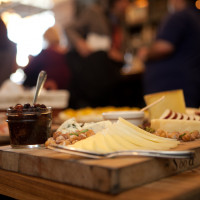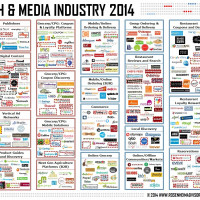Ever go out to eat, have a delicious ethnic meal, and leave thinking you’ll never know how it’s made? Global Kitchen is a new startup that might have something for you.
Launched by a trio with experience in Community Supported Agriculture (CSAs) and international development, Global Kitchen is an online resource for traditional, authentic recipes that it bubbles up through immigrant-led cooking classes. Chef instructors and students gather in a kitchen to learn how to make a traditional recipe, like Guyanese Bora Curry, and share in the culture around it. The recipe is then featured on the website.
“Our long term plan is to create an extensive, online hub for all of the authentic recipes we collect and make them available to people outside of New York City, supplemented with cooking demo videos on our website,” says Leah Selim of Global Kitchen (who, full disclosure, is also an occasional contributor to Food+Tech on international development). The team, which also includes Pete Freeman and Ryan Brown, originally won an NYU Stern School of Business contest for its business plan.
Now, to get things off the ground, the company is seeking funding on RocketHub to help with startup costs that include securing kitchen space, video production and paying chef instructors. RocketHub is a crowdfunding platform that is maybe lesser-known to most than Kickstarter. There were a few reasons that the Global Kitchen team went with it, including the level of attention they felt they received from RocketHub and its support in promoting their campaign through its own newsletter and communications. Also, significantly, RocketHub lets fundraisers keep the money they raise even if they don’t meet their target goal, which is different than KickStarter where you either hit your goal and keep the funds or don’t and don’t. “I think all of us feel a lot of personal investment in this enterprise and losing those start-up funds just wasn’t a risk we wanted to take,” says Selim.
Global Kitchen shares some similarities with another, San Francisco-based startup, Culture Kitchen. The latter delivers “ethnic cooking kits” every month, along with recipes, that help people learn to cook ethnic dishes at home. The company used to offer in-person cooking classes as well but as it describes in a post, “as our subscription base for Culture Kitchen Kits grew we knew we needed to make some decisions about how we could grow Culture Kitchen,” so in order to focus on growing the kit community on a national scale, “we have decided to put a hold on in-person Cooking Classes.”
For Global Kitchen, its chef instructors are immigrants who are already in the process of setting up their own food-related businesses, says Selim, so the cooking classes are not their sole focus, more an opportunity. And for Global Kitchen, it could turn the classes into demo videos and monetize them through advertising and partnerships. “We obviously love what [Culture Kitchen] is doing, and perhaps our two different trajectories will even allow us to partner up sometime in the future,” says Selim.
If Global Kitchen gets its model running smoothly, maybe soon enough you’ll be walking home from class knowing exactly how to “make that dish” at home, and where to go if you forget how.





